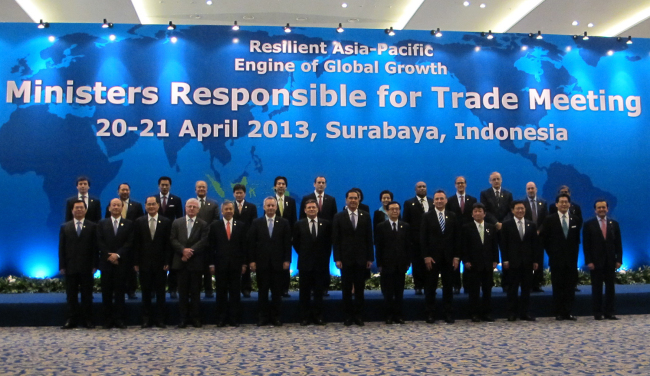 |
Delegates pose for a group photo after the opening ceremony of the APEC trade ministers’ meeting in eastern Java’s Surabaya, Indonesia, Saturday. (Xinhua-Yonhap News) |
SURABAYA, Indonesia (AFP) ― Japan won its bid to enter talks on a massive Pacific trade pact Saturday after winning over its last opponent, Canada, for a proposed agreement that would account for more than 40 percent of the global economy.
The decision became unanimous when Canada “successfully concluded” consultations with Japan after being the sole nation of 11 in the U.S.-driven Trans-Pacific Partnership that still opposed Tokyo’s participation.
“As the world third largest economy, having Japan at the table is going to add additional value to all of the TPP partners,” Canadian Trade Minister Ed Fast told reporters.
“These consultations have been informed by a robust and ongoing engagement with Canadian stakeholders, and it’s that engagement that helped inform this process,” Fast said earlier in a statement sent to AFP.
“We look forward to continuing to work together (with Japan) to deepen our trade and investment relationship in a manner that will generate significant benefits for hard-working people in both our countries.”
Japan’s Ministry of Economy APEC Office Director Ken Sasaji said Japan’s participation in the talks was a major step toward the TPP’s aim to create a free-trade zone among nations on the Pacific Rim.
“As APEC leaders agreed, our final destination is FTAAP ― a free-trade agreement in the Asia-Pacific,” Sasaji told reporters.
“Now Japan is promoting various efforts to promote economic integration and economic partnerships, especially the trans-Pacific partnership, which is one of the most important efforts.”
Canada’s approval came after bilateral talks on the sidelines of an Asia-Pacific Economic Cooperation trade ministers’ meeting in the Indonesian city of Surabaya.
Fast said the TPP offered “tremendous opportunity to expand Canada’s partnerships in Asia” while strengthening relationships in the Americas.
“Concluding an agreement with our TPP partners that advances Canadian interests is a key part of our government’s ambitious pro-trade plan,” Fast said.
With the entry of Japan into the free-trade talks the pact would cover nearly 40 percent of the global economy, making it the biggest free-trade agreement in the world.
The bloc is aimed creating a tariff-free zone with a market of around $25 trillion covering some 800 million people.
Although member countries had expressed interest in Japan joining the talks, many wanted to see Tokyo make firm commitments in reducing tariffs on imports.
Washington earlier this month gave Japan the thumbs-up for talks on the free-trade agreement despite opposition from Japanese farmers and some U.S. labor groups and manufacturers.
To allay concerns of higher competition in the U.S. automotive industry, Japan agreed that U.S. tariffs on its cars would be phased out at the latest possible time allowed by a future accord.
President Barack Obama has championed the TPP as a way to boost the U.S. economy through trade and to build a U.S.-driven order in a fast-growing region where China ― which is not part of the talks ― is gaining clout.
Japan joins Australia, Brunei, Chile, Canada, Malaysia, Mexico, New Zealand, Peru, Singapore, the United States and Vietnam in TPP negotiations.







![[Weekender] Korea's traditional sauce culture gains global recognition](http://res.heraldm.com/phpwas/restmb_idxmake.php?idx=644&simg=/content/image/2024/11/21/20241121050153_0.jpg)
